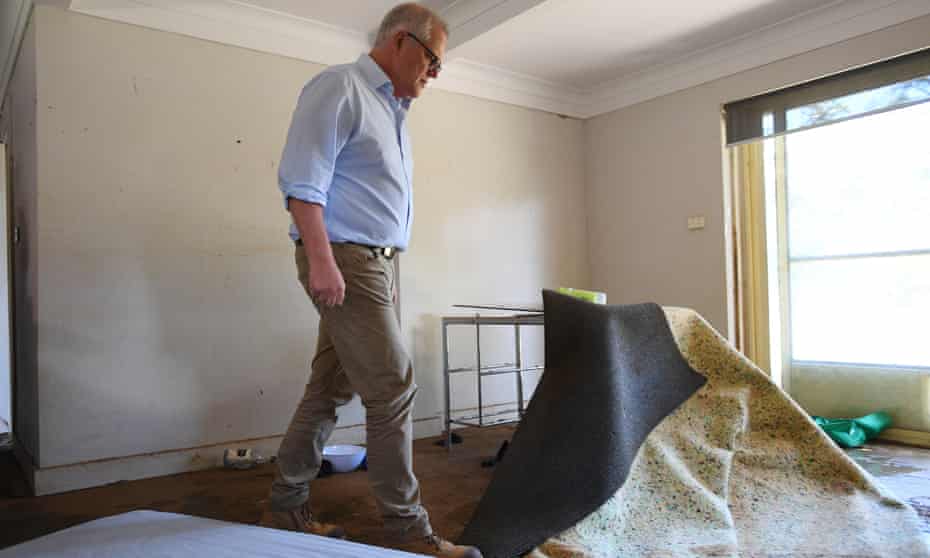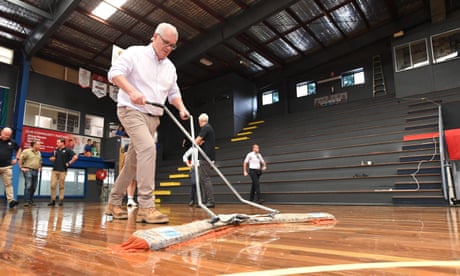Extract from The Guardian
Climate denial, ducked responsibility, incompetent service delivery – they all collided, and voters took note.

The flooding that has ravaged south-east Queensland and northern New South Wales over the past month represents a perfect political storm for a prime minister about to face the people he purports to lead.
While the levees have breached in one tributary of Liberal National party heartland, the implications will be more broadly felt, with hapless, homeless victims serving as living testament to Scott Morrison’s limitations all the way to voting day.
The PM is the consummate marketer whose commitment to his craft is such that even his failures are packaged into simple, reusable soundbites: “This is coal, don’t be scared”, “I don’t hold a hose, mate” and “It’s not a race.”

Climate denial, abrogation of responsibility and incompetent delivery of services: the floods have tied these memes seamlessly into a single environmental-economic-social catastrophe. Let’s break it down.
First the lump of coal. As treasurer, Morrison infamously fondled a lump of coal in parliament to ridicule Labor’s call for energy transition. He amped up the same shtick to fuel his 2019 victory, reassuring rural voters there would be no climate action on his watch.
But after a term bookended by catastrophic bushfires and floods, the prime minister now finds himself wedged between those who believed his promise to hold back history and an urban insurgency demanding he do better.
The pressure from the business community and the teal independents has driven a change in the rhetoric since Glasgow, with the government now holding a modest 2050 target (albeit insufficient) in the hope he could pacify his own base.
But as this week’s Essential Report shows, these floods serve as a reminder that the Coalition government’s ambitions over the past three terms have been too limited and we are now all paying the price for that neglect.
We see strong support for statements framing floods around the need for action on climate change and renewable energy, as well as a significant endorsement of the proposition that the government had contributed to the floods through its lack of action. Pointedly this final figure includes one-third of Coalition voters.
While the Hawaiian sojourn was unforgettable, we can’t really blame the prime minister for being slow on the ground this time given he had a bout of Covid. But what is being brutally exposed is the lack of any preparation for what, in his own words, has become Australia’s new reality.
The original “hose” statement was an attempt to explain the chain of command in national disasters; but in the floods the problem that has been exposed is there is no chain, just slashing and slushing.
Since coming to power in 2013 the Coalition has defunded the National Climate Change Adaptation Research Facility and the independent Climate Commission, and streamlined the CSIRO’s Climate Adaptation Flagship.
Closer to the flood epicentre, the National Centre for Flood Research at Southern Cross University in Lismore has been sequestered, while the National Resilience and Recovery Agency chose not to direct government funds to Lismore.
Finally, to the sense of urgency that leadership in a crisis demands. Even when Morrison did turn up, there was a slow-walk into deploying emergency support, including getting into a semantic debate over who had to seek help and when, rather than recognising the impending crisis and getting ahead of it.
At a time when the government is trying to stabilise, a separate question in this week’s report shows a further erosion of regard for the government in the management of the floods.
Despite such virulent shortcomings we should remain cautious about concluding that the PM is sunk. The “ScoMo” brand that he lovingly created before the 2019 election still delivers among those sections of the electorate who view politics from the corner of their eye.
A real tell in focus groups that I have observed is whether the participant refers to Morrison as ScoMo. Where they do the brand provides a protective shield around him; while they recognise his missteps, they are far more prepared to forgive him. After all, “you can’t blame ScoMo for the pandemic”.
Elections are not a contest of ideas. They are contests of competing realities, each side stubbornly clinging to their “facts”. And, as a final question in this week’s report shows, people don’t really believe anything they hear from politicians any more.
You can read these numbers with despair (how can we ever agree if we don’t have a common starring point?) or as the healthy scepticism of the majority of voters who will not simply accept what they scroll or hear.
In this context, the perfect storm plays a seminal role. It challenges ScoMo’s version of an upbeat reality where we are in safe hands by providing a series of irrefutable, inconvenient truths.
Like: governments that hold back energy transition should be culpable for their inaction. Like: climate change is already happening and remediation needs to be turbo-charged. And like: you have to believe in the idea of government if you are to have any hope of governing.
Peter Lewis will discuss the findings of the week’s Guardian Essential report at 1pm on Tuesday – free registration here
No comments:
Post a Comment